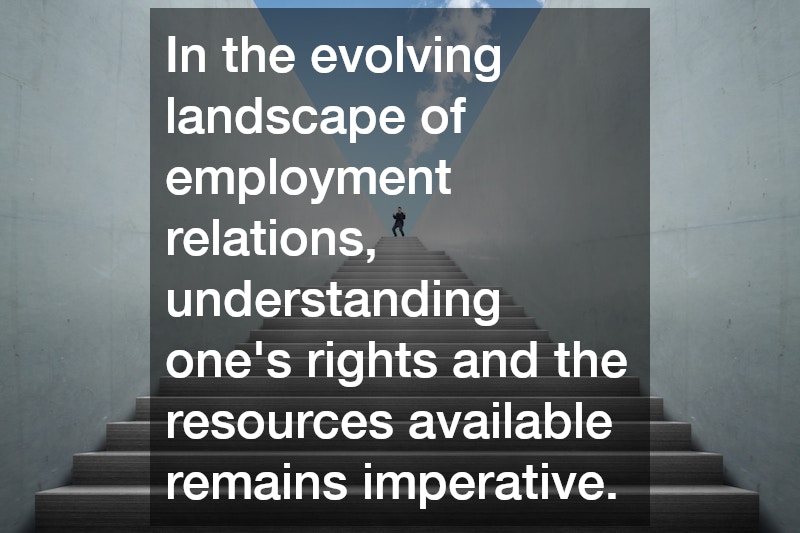Workplace disputes can be complex and challenging to navigate without legal expertise. In many situations, employees and employers find themselves entangled in conflicts that require a more structured resolution. Whether it’s an issue of unfair dismissal, harassment, or wage disputes, knowing when to seek employment law services can be crucial in protecting your rights and interests.
Understanding the Scope of Employment Law
Employment law encompasses a wide range of statutory laws and regulations designed to protect the rights of employees and ensure fair treatment in the workplace. It covers several areas, including wages, workplace safety, discrimination, and wrongful termination.
When disputes arise in any of these areas, navigating the complexities without professional assistance can prove to be challenging and may affect the outcome.
Many employees might initially attempt to resolve disputes internally or through human resources. However, when negotiations fail or if there’s a significant power imbalance, this can be inadequate. Seeking employment law services early can ensure that you properly document your case and adhere to legal protocols, potentially preventing further escalation.
Different jurisdictions may have varied employment laws, making it essential to consult professionals familiar with local legislation. Lawyers specializing in employment law can offer guidance tailored to your specific situation. They can help articulate your rights clearly and prepare a strategic approach to addressing the grievance within the framework of existing laws.
Recognizing Serious Incidents that Require Legal Intervention
While minor workplace grievances can often be resolved amicably, more serious incidents necessitate professional intervention. Situations involving discrimination, harassment, or a hostile work environment typically require employment law services. Immediate legal consultation can aid in protecting your employment rights and preserving a healthy work atmosphere.
For instance, harassment claims often need substantial evidence and a methodical approach to documenting incidents. Working with an employment lawyer helps ensure that all necessary evidence is compiled promptly and correctly. Having legal support also assists in building a case that accurately highlights the severity of the issue to protect against retaliation or dismissal.
Timely intervention by legal experts can also prevent ongoing issues from escalating. This approach proves beneficial for both employees and employers in fostering a safe workplace environment. Furthermore, it ensures that resolutions are made expediently and continue to uphold the legal standards set forth by employment legislation.
The Role of Legal Support in Wage Disputes
Wage disputes often arise from misunderstandings or non-compliance with fair pay regulations. Legal support from employment law professionals plays a crucial role in resolving such disputes effectively and equitably. For individuals facing wage disagreements, consulting a specialized lawyer can provide clarity on entitlements and the appropriate steps to take.
Employment lawyers can assess whether an employer has violated labor laws regarding compensation, benefits, or overtime pay. They help gather necessary documentation such as payslips, employment contracts, and time records to support your claim. Moreover, professionals in this field understand how to navigate negotiations or litigation to achieve a fair outcome.
In some cases, wage disputes may stem from broader issues like inequality in pay or breach of contract, which require deeper investigation. Legal experts in employment law can assist in uncovering systemic issues and seeking long-term solutions. The aim is always to rectify any disparities and secure fair compensation in line with legal entitlements and industry standards.
When Dispute Resolution Fails
Resolving workplace conflicts internally or through mediation can be an efficient and cost-effective solution. However, when these measures fail, seeking professional legal counsel becomes critical. Legal intervention is particularly important when employers disregard resolutions or continue to violate employment terms.
Lacking the legal knowledge to proceed can leave the aggrieved party vulnerable. In such cases, a skilled employment lawyer provides the necessary guidance to navigate complex legal processes. They ensure that all actions are compliant with the law and strategically position your case for the best possible outcome.
Escalating a dispute through legal channels may also serve as a necessary check on corporate practices. It reminds companies of their legal obligations and the importance of fostering fair employment standards. Ultimately, engaging experienced employment law counsel not only upholds individual rights but also promotes broader workforce equity and justice.
Workplace disputes, if left unresolved, can severely affect both personal and professional environments. Recognizing when to seek expert legal assistance can significantly influence the resolution process. Legal professionals provide invaluable guidance and representation, ensuring that disputes are addressed efficiently and in accordance with legal standards.
Whether facing issues related to discrimination, wage discrepancies, or unresolved conflicts, seeking expert legal advice is a prudent decision. Employment law services offer both employees and employers the support needed to navigate these challenges effectively. Emphasizing the importance of legal intervention supports a fair, just, and equitable work environment for all.
In the evolving landscape of employment relations, understanding one’s rights and the resources available remains imperative. By being informed and proactive, individuals and organizations can ensure that their workplaces operate under principles of fairness and legality. Ultimately, the timely involvement of professional legal services can lead to more favorable outcomes in resolving workplace disputes.








